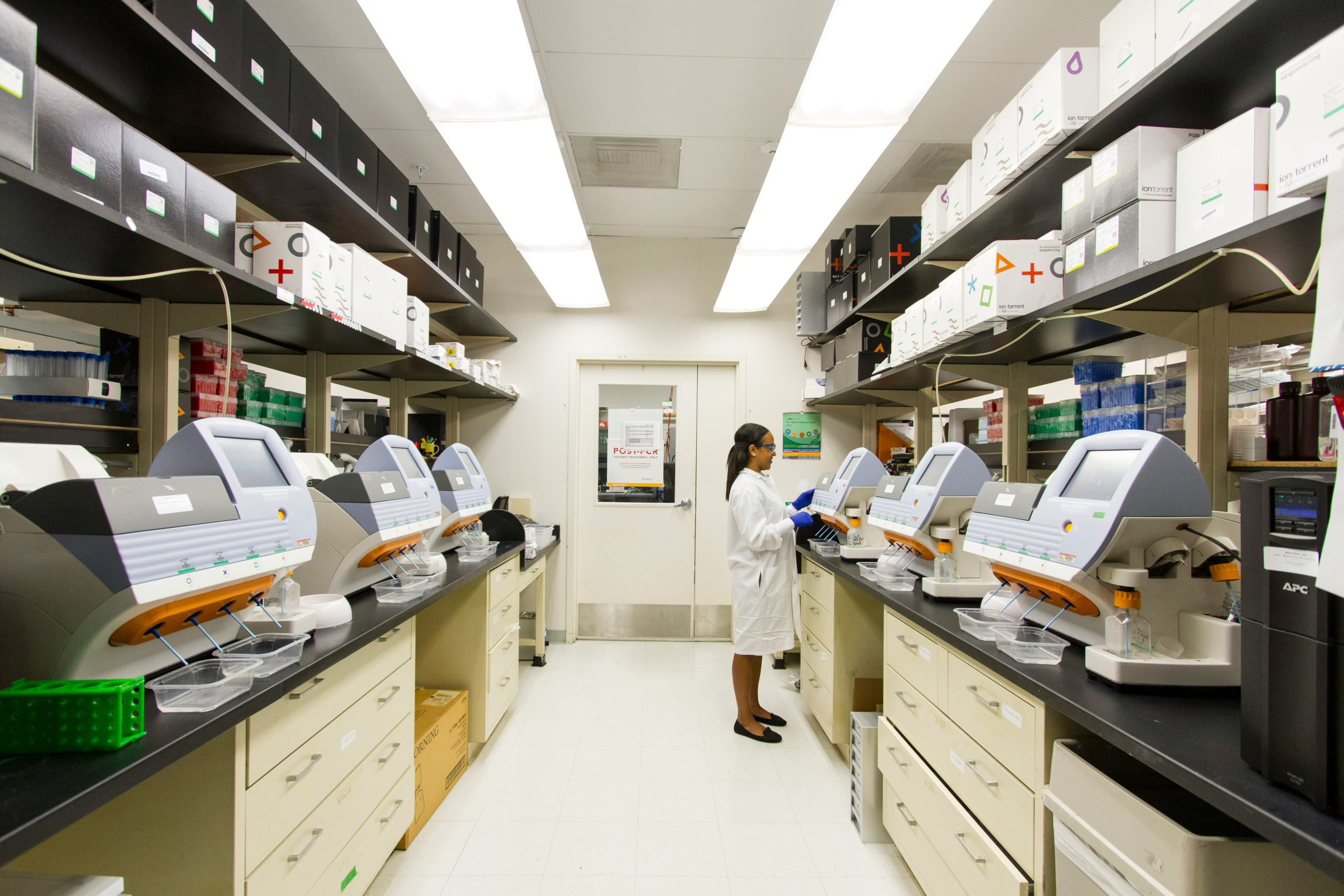Green Impact Laboratory Accreditation
Green Impact is a sustainability programme run by the charity Students Organising for Sustainability (SOS UK). Green Impact Laboratory Accreditation (GILA) is an additional support package we offer with actions specific to a research laboratory setting.
Each laboratory completes the necessary actions, is audited, then receives a nationally standardised GILA certificate. The certificate demonstrates progress towards embedding sustainability in research.

Why would I need Green Impact Laboratory Accreditation (GILA)?
Green Impact uses an online toolkit to support teams of staff in many different organisations to create positive action in their area of work. These toolkits are bespoke to each organisation, completely tailored and accessible to teams, and contain only locally relevant information in line with local sustainability priorities.
With sustainability becoming a higher priority across all major organisations, funding bodies are now frequently looking for applicants to show evidence of achievement in a sustainability programme. Therefore, we introduced a nationally standardised certificate that is easily recognised by research grant managers and other stakeholders, and which demonstrates that the laboratory has achieved the expected level of environmental compliance.
Our research laboratory-specific module contains 54 nationally standardised actions to work towards sustainable laboratory practice. This fulfils the criteria of funding bodies to participate in a sustainability programme (e.g. Wellcome Trust; Cancer Research UK). If you work in a laboratory, you can share your GILA certificate when applying for research grants as evidence of your commitment to, and progress towards, environmentally sustainable research.
What support is available with Green Impact Laboratory Accreditation (GILA)?
No GILA support
- Laboratory-specific actions on your toolkit as part of the Green Impact award
- Remote Q&A session with your teams
- An audit for each laboratory (up to 40 labs)
- An approved GILA certificate for each successful participating laboratory (up to 40 labs)
- An audit for each laboratory (40+ labs)
- An approved GILA certificate for each successful participating laboratory (40+ labs)
- An additional lab-specific auditor training session and audit period
GILA Tier 1
- 54 nationally standardised laboratory-specific actions on your toolkit
- Remote Q&A session with your teams
- An audit for each laboratory (up to 40 labs)
- An approved GILA certificate for each successful participating laboratory (up to 40 labs)
- An audit for each laboratory (40+ labs)
- An approved GILA certificate for each successful participating laboratory (40+ labs)
- An additional lab-specific auditor training session and audit period
GILA Tier 2
- 54 nationally standardised laboratory-specific actions on your toolkit
- Remote Q&A session with your teams
- An audit for each laboratory (up to 40 labs)
- An approved GILA certificate for each successful participating laboratory (up to 40 labs)
- An audit for each laboratory (40+ labs)
- An approved GILA certificate for each successful participating laboratory (40+ labs)
- An additional lab-specific auditor training session and audit period
The Green Impact lead at your institution will know what support you have. In some cases, different arrangements are made to suit specific organisations.
Frequently asked questions about GILA
How many actions do I need to complete?
You must gain at least 175 points from actions tagged as GILA, including 7 mandatory actions, to gain accreditation. This works out to be at least 30 of 54 actions.
I’m worried I won’t be able to complete all of the actions in my lab due to certain restrictions! What can I do?
You do not need to complete all actions in the GILA module. This allows for flexibility in the nature of different labs spaces, and means you can choose the actions most relevant to your work whilst still ensuring significant progress has been made.
When and how will we be audited?
If your organisation has Tier 1 GILA support, you will be audited at the same time as the usual Green Impact audits. If there is Tier 2 support, lab-specific audits will be arranged at a separate time, up to a couple of months before/after the standard Green Impact audits.
You will be audited by students who are trained by SOS UK during a half-day training course. These auditors will then look through the evidence and comments you have uploaded to the toolkit, and they will also arrange an audit call with you to talk through any clarifications that are required.
What are the requirements of funders?
For the Wellcome Trust, current guidance is that Research Academics must hold a GILA certificate (or equivalent) when applying for funding. The Wellcome Trust have included this line in their updated funding policy:
Laboratories should achieve the minimum level of accreditation offered by LEAF, My Green Lab or equivalent by the end of 2025. (GILA is counted as ‘equivalent.’)
For Cancer Research UK, current guidance is that Lead and Joint Lead applicants must hold an accreditation. They have included the following in their funding policy:
Lead and Joint Lead applicants must hold the Laboratory Efficiency Assessment Framework (LEAF) or My Green Lab Certification at the Silver level, or an equivalent for their research group(s) at the time of submission; either attach the certification to their funding application or provide a link to a publicly available list of accredited research groups at their Host Institution(s). (GILA again is counted as ‘equivalent’ to silver level.)
[This information was updated in August 2025. Please refer to funder websites in case of any recent developments.]
One of the labs in my department is working towards their GILA certificate. Can I use that certificate as evidence in my funding bid?
Each Principal Investigator (PI) needs a certificate for each laboratory they work in. The certificate is for a physical space, NOT for a person. A ‘laboratory’ is defined as one physical room OR a group of up to six adjacent rooms, provided they are managed by the same person and procedures. Funders are looking for PIs to show evidence of commitment to sustainable research, and it will not be enough for the applicant(s) to say that their building/department is covered by a wider team certificate. This may not be necessary for all funding bodies. If you are unsure you should look for specific guidance in their requirements or contact your grant officer.
For the Wellcome Trust, current guidance is that Research Academics must hold a GILA certificate, and an institutional/college/school approach is not sufficient or in line with their funding policy. The Wellcome Trust have included this line in their updated funding policy:
Laboratories should achieve the minimum level of accreditation offered by LEAF, My Green Lab or equivalent by the end of 2025. (GILA is counted as ‘equivalent.’)
For Cancer Research UK, current guidance is that Lead and Joint Lead applicants must each hold an accreditation. They have included the following in their funding policy:
Lead and Joint Lead applicants must hold the Laboratory Efficiency Assessment Framework (LEAF) or My Green Lab Certification at the Silver level, or an equivalent scheme for their research group(s) at the time of submission; either attach the certification to their funding application or provide a link to a publicly available list of accredited research groups at their Host Institution(s). (GILA again is counted as ‘equivalent’ to silver level.)
What if one PI manages multiple labs?
The PI will need a certificate for each lab. They do not need to lead the Green Impact team for each lab. We advise, in the interest of admin burden sharing, that one PI leads the Green Impact team for one lab and delegates the teams for other labs to other PIs or researchers.
What if multiple PIs use the same lab(s)?
All PIs using that lab can be named on the GILA certificate for the lab – please look at your Team Settings on the toolkit and enter the PI names under the relevant question. Ensure all PIs who use the lab are named even if they are not leading GILA for that specific lab.
What if I need the certificate to apply for funding before the audit date?
If you have just joined the organisation, or have been on extended leave, you may have not had the opportunity to complete GILA before you need to apply for funding. In this case, you can apply for an ‘In Progress’ certificate.
Both Cancer Research and Wellcome Trust are aware of this certificate and will accept it to fulfil their requirements.
Some things to consider:
- You can only get one ‘In Progress’ certificate, and it will last until your next GILA audit date (so when the next annual cycle launches, you will need to work on getting your full GILA accreditation with everyone else).
- Your team must have completed at least five of the required actions, and pledged to complete the rest.
- To be eligible, you need either:
-
-
- Have joined the University since the last GILA certification date but be applying for funding before the next GILA certification date
- Have been on extended leave
- Be able to reasonably justify why you couldn’t get a full GILA certificate this year (e.g. a change in lab during the academic year)
-
-
About Green Impact
Help & Support
Socials

